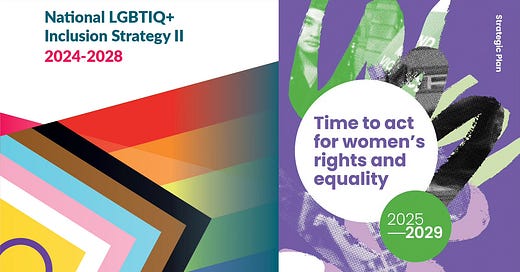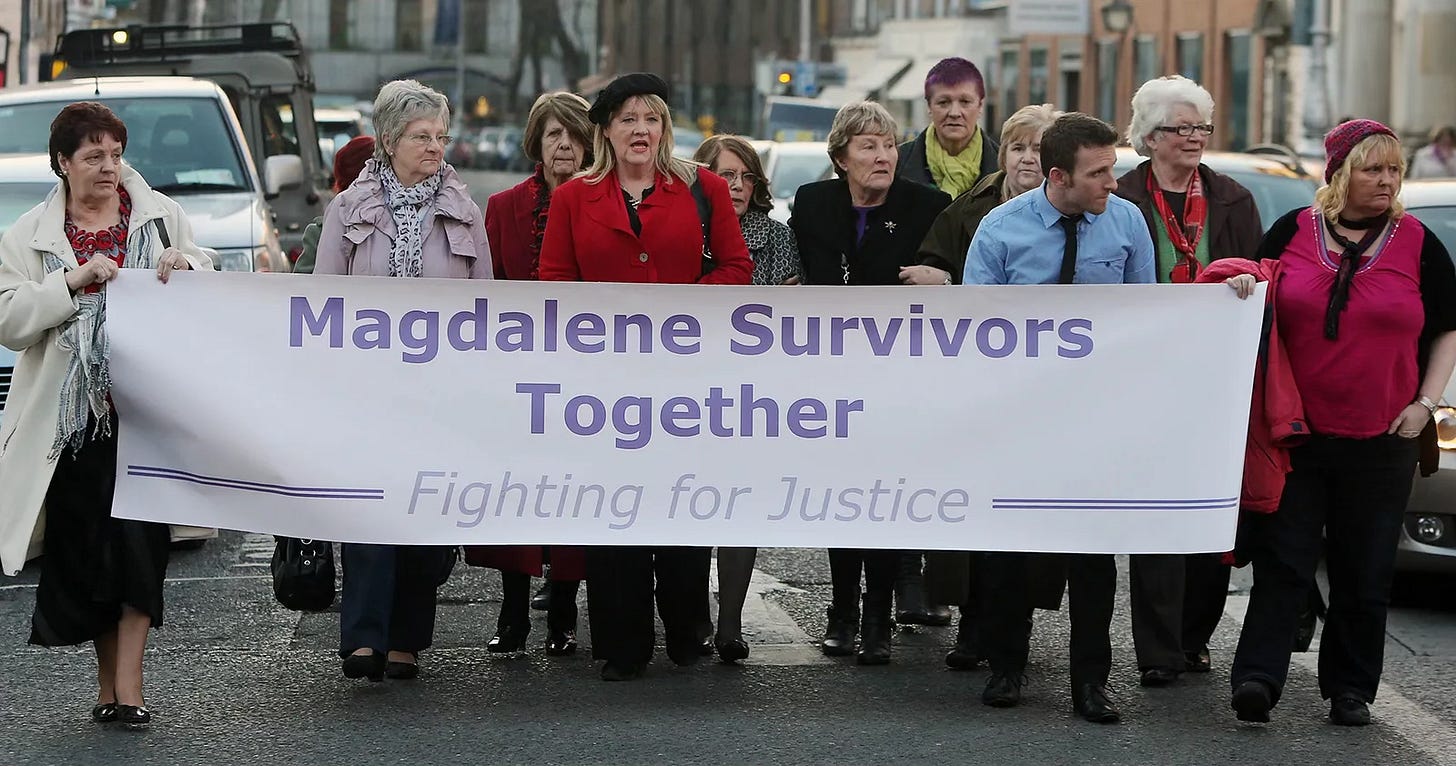Ireland's Inclusion Agenda is Progressive Mirage
How the Inclusion Agenda betrays women, children, and its own hard-won lessons, by Genspect Ireland's Director,
Last week, Ireland released two flagship policy documents: the National LGBTIQ+ Inclusion Strategy II (2024–2028) and the National Women’s Council Strategic Plan (2025–2029). Both are framed as bold statements of compassion and modernity. Both signal Ireland’s ambition to become a global leader in equality and human rights. And both, on close inspection, reveal a country out of step with emerging international standards, captured by ideology, and increasingly indifferent to the voices of those it claims to protect.
What is presented as progress is, in fact, a refusal to face growing medical, legal, and ethical concerns. These strategies speak of inclusion but impose conformity. They invoke care but remove safeguards. They promise justice but erase biological sex, suppress dissent, and endanger the wellbeing of women and children.
The discovery in Tuam of the remains of 796 infants in a disused sewage system outside a mother-and-baby home shocked the world. But the deeper horror was not just the death toll. It was the systematic erasure of those lives by institutions that claimed to know what was best. State and religious authorities operated with moral certainty, confident they were acting for the greater good. Criticism was silenced, victims were ignored, and safeguards were nonexistent.
Today, the rhetoric has changed. But the same mechanisms of institutional capture and moral enforcement are reappearing, this time cloaked in the language of rights and identity.
Feminism Without a Definition of Woman
The National Women’s Council Ireland (NWCI) Strategic Plan is a case study in how advocacy can lose its foundation. The document never defines what a “woman” is. It refers to “all women in their diversity,” “LGBTQI+ women,” and “different gender expressions,” but offers no biological or legal definition of the category on which its entire mission depends.
This is not a rhetorical oversight. Without a definition of “woman,” sex-based rights become unenforceable. Data collection becomes meaningless. Discrimination can no longer be tracked. The result is a feminist strategy that cannot say what a woman is, yet claims to speak for all women.
The plan also fails to engage with major international developments. There is no reference to the 2024 Cass Review, which found that gender-affirming medical care for children and adolescents was unsupported by robust evidence. There is no mention of the Sullivan Review, which warned that replacing sex with gender identity in official data had compromised service provision and distorted statistics. The NWC does not reference the 2022 UK Supreme Court ruling in For Women Scotland v Scottish Ministers, which affirmed that sex in equality law means biological sex.
These are not fringe concerns. They are now informing national policies across Europe. Yet the NWCI has chosen to ignore them, along with the growing numbers of detransitioned women, many of whom say they were harmed by precisely the kind of uncritical, affirmation-driven care the plan promotes.
A Gender Strategy Built on Ideology, Not Evidence
If the NWCI plan is silent on biology, the LGBTIQ+ Inclusion Strategy II is openly hostile to it. It treats gender identity as a fixed and inviolable truth. It promotes the expansion of medical transition services as a policy goal, while failing to mention any of the international caution now shaping clinical practice elsewhere.
The strategy celebrates Ireland’s 2015 self-ID law, which allows people to change their legal sex by statutory declaration, and commits to expanding this model. But there is no discussion of the legal tensions this creates. No acknowledgement of how this affects women’s spaces, prisons, sports, or data collection. No recognition that other countries are now moving in the opposite direction.
The Cass Review concluded that there was insufficient evidence to support the routine prescription of puberty blockers or cross-sex hormones to children. The study found high rates of mental health issues, autism spectrum conditions, and trauma among gender-distressed youth, and urged a shift toward exploratory psychological care. In its wake, Sweden, Finland, Norway, and parts of Australia revised their guidelines. Puberty blockers have now been restricted to clinical trials in Sweden. Finland prioritises talk therapy. Norway halted hormonal treatment for minors outside tightly controlled research settings.
Ireland’s strategy mentions none of this. It describes limited access to trans healthcare as a failing to be rectified, rather than an indicator of reasonable caution. It uses the language of crisis to push for faster, easier medicalisation, while offering no data on long-term outcomes, regret rates, or detransition.
This is not health policy. It is belief codified into law.
The Chilling Effect of “Conversion Practice” Bans
One of the most legally dangerous proposals in the LGBTIQ+ strategy is the planned ban on “conversion practices.” The intention, on the surface, is to protect individuals from coercive attempts to change their sexual orientation or gender identity. But the document does not define what constitutes a “conversion practice” when it comes to gender.
This ambiguity creates profound risks. Without clear legal exemptions for exploratory therapy, therapeutic neutrality, and parental rights, such a ban could criminalise good clinical care. In Canada, gender clinicians have been disciplined for simply encouraging young patients to explore their feelings. In Victoria, Australia, parents and pastors have been warned not to discourage children from transitioning, even when medical concerns exist.
The Australian Human Rights Law Centre has called for clarification of these laws after clinicians reported confusion and fear about what conversations were legally permissible. Meanwhile, detransitioners say that affirmation-only models prevented them from receiving proper psychological support.
In Ireland, the proposed ban could suppress precisely the kind of careful, therapeutic work that the Cass Review now recommends. It could also violate clinicians’ obligations to “first, do no harm.”
A Strategy That Refuses to See
Across 50 pages, the LGBTIQ+ strategy never once uses the word “detransition.” It offers no support services for those who regret transition. It includes no discussion of diagnostic safeguards, comorbidities, or informed consent, despite international consensus that these are crucial issues.
A 2021 UK study by the Tavistock and Portman NHS Trust found that 35 percent of youth referred for gender identity services had autism spectrum traits. Meanwhile, the number of young women expressing gender distress has skyrocketed. In Ireland, the number of adolescents referred for gender-related care grew by over 400 percent between 2015 and 2020, according to the HSE, yet no formal audit has been conducted on outcomes, safeguarding, or regret.
This is not inclusion. It is deliberate blindness.
Data Without Sex Is Data Without Meaning
The Sullivan Review showed that removing sex from official statistics caused real harm. Cancer screenings were missed. Male offenders were recorded as women. Gender pay gaps were miscalculated. The UK now requires public bodies to collect sex and gender identity as separate variables.
Ireland’s strategy does the opposite. Both strategies use euphemistic, often invented language. Terms like “sex characteristics,” “diverse identities,” and “inclusive data practices” are deployed to obscure rather than clarify. There is no guidance for public bodies on how to record sex-based data. The erasure of sex is not an accident. It is official policy.
This will render key public services, including health, crime, education, and employment, statistically unreliable. If women cannot be counted, they cannot be protected.
Dissent Framed as Harm
Both the LGBTIQ+ strategy and the NWCI plan express a desire to combat “misinformation” and “online harm.” In the absence of definitions, these terms risk being used to silence legitimate concern. Will citing the Cass Review be considered misinformation? Will critics of gender self-ID be prosecuted for hate speech?
Recent developments suggest this is not a paranoid question. In Ireland, Genspect, founded by psychotherapist and author Stella O’Malley, has been criticised and mischaracterised as bigoted simply for advocating evidence-based approaches to gender-related care. Social media platforms have censored discussion of detransition. Parents who question school policies report being excluded from consultation processes.
Strategies that criminalise dissent or treat alternative views as dangerous are not democratic. They are authoritarian.
Who Was Consulted - and Who Was Not?
Both strategies claim to be inclusive. But their consultations reveal narrow ideological capture. Stakeholder input was drawn largely from activist and civil society groups that already endorse gender identity ideology. There is no record of engagement with gender-critical feminists, detransitioners, safeguarding experts, or clinicians raising alarms.
This is not inclusion. It is selection bias.
A Country Out of Step
Ireland’s political class appears unaware that the global consensus on gender identity is shifting. In 2023, the World Health Organisation stated that more research was needed before affirming the benefits of transition-related care for minors. In 2024, the UK paused its youth gender services. In 2025, France and Germany opened parliamentary inquiries into medical harms and self-ID law.
Ireland is not leading the world. It is ignoring it.
Conclusion: Never Again, Once Again
The bodies uncovered in Tuam are a symbol of how systems that claimed to care can perpetrate unimaginable harm when scrutiny is absent and dissent is suppressed. The Magdalene Laundries operated for decades under similar pretences of morality and protection, while women and girls were exploited, confined, and erased
The National LGBTIQ+ Inclusion Strategy II and the National Women’s Council Strategic Plan are not safeguards. They are blueprints for the suppression of evidence, the erasure of women, and the ideological capture of medicine, education, and law.
Progress without accountability is not progress. Inclusion without definition is not inclusion. Care without caution is not compassion.
Ireland can still correct course. It can centre evidence. It can protect rights without enforcing belief. But it must start by remembering that slogans are not safeguards and that truth, not ideology, must be the foundation of justice.
Sara Morrison is the director of Genspect Ireland









This is a brilliant article, naming clearly and correctly how the Irish government refuses to acknowledge reality, but follows an ideology which is being increasingly exposed for harming women, children gays, lesbians because it is based on a lie! They need to listen and not brand dissenting voices as far right, spreading misinformation. - If there was a referendum today asking whether gender-identity belief should be adopted officially in this country, and taught in school as fact, - my bet is that the NO vote would win. Should we demand a referendum?